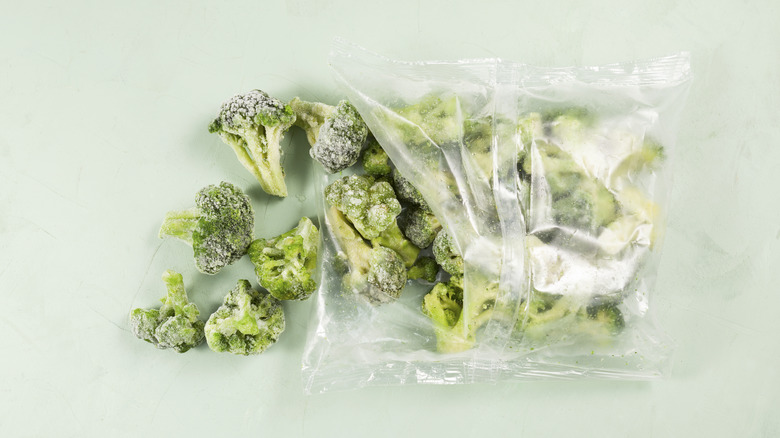Why Frozen Broccoli Is More Nutritious Than Fresh
We all love those bountiful harvest months, gracing us with fresh fruit and vegetables for our tables, picnics, and family-night suppers. But when winter descends, we need that nutrition even more. Fortunately, thanks to a manmade innovation called freezers, we can spread the culinary joy through dormant field and orchard months. Nothing beats fresh-picked for flavor and texture — but what about nutrition?
Fortunately, in a 2015 comparative study published in the Journal of Agriculture and Food Chemistry, Dr. Ali Bouzari determined that frozen produce holds equal footing with its fresh counterparts when it comes to nutrition. In fact, with some vegetables, including broccoli, the frosty version reportedly comes out ahead. The process of blanching broccoli and then freezing it increases the usual amount of riboflavin naturally found in broccoli florets. Since riboflavin, also known as vitamin B2, is a known energy booster and antioxidant that aids immune-system performance, frozen broccoli can facilitate healthy outcomes during the colder seasons (per StatPearls).
As far as the texture and taste of frozen broccoli versus fresh, many consumers claim the frozen variety keeps its structure and remains just as crunchy as fresh florets, as long as they aren't overcooked. With a typically lower cost, instant accessibility, and less food waste from a freezer's capacity to preserve freshness longer, frozen broccoli starts to look — and taste — pretty good.
In addition to the scientifically-explained boost of riboflavin in frozen broccoli, other factors contribute to the nutritional value of frozen vegetables, including broccoli.
Freezing broccoli locks in freshness
Fresh-from-the-field produce is a veggie lover's culinary dream. But even with the abundance of summer and autumn harvests, keeping produce in peak condition on its way to our plates is a modern-day challenge. A relatively few number of consumers grow their own food, and many live far from fertile farmlands. That means those vibrant, verdantly hued heads of broccoli have a long journey from field to market to final dinner plates.
With every mile of boxed transport, through heat and exposure to sunlight or air, and then perching in warehouses and supermarket bins, fresh produce such as broccoli gradually loses nutrients (via Geisinger). By the time it lands in your refrigerator, eventually becoming part of a well-planned nutritious dinner, broccoli can be a shadow of its farm-fresh young self. A solution for that is freezing the florets at peak ripeness, soon after leaving the field. This locks in freshness and preserves those beneficial nutrients.
Choosing frozen broccoli in the supermarket
Freezing vegetables yourself is different from buying ones pre-frozen at the supermarket. Home freezers can take longer to properly freeze food — whereas flash freezing prevents ice crystals from forming and instantly stops cellular degradation of vegetables. This method of freezing uses very low temperatures and cold air dispersal to quickly protect the flavor, freshness, texture, and nutrients before degradation begins. Plus, the sooner the veg is frozen after being harvested, the better.
Ideally, the broccoli or any other frozen vegetables will be labeled as flash frozen. However, the USDA and FDA do not require disclosure of freezing methods, so conduct some research on frozen food brands to determine how they're processed. Avoid ones with sauces or seasoning, and check for additives that could alter the taste and texture, and potentially compromise nutrition values. For example, Birds Eye specifies that its frozen vegetables are picked at peak ripeness, and then flash-frozen with no preservatives, artificial colors, or artificial flavors.
If you're lucky enough to gather an abundance of farm-fresh broccoli in the summer, it's still a good idea to freeze it yourself. Home freezers may not have circulating air and super-low temps like commercial equipment, but it's still possible to do a somewhat comparable home version of flash freezing. Simply separate broccoli florets and lay them without touching on a baking sheet. Then freeze until firm and store in an airtight container.



